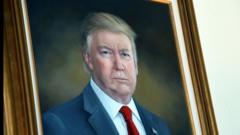In a recent turn of events, President Donald Trump has found himself under the spotlight not just for his policies but also for his image, as he received a painting from Russian President Vladimir Putin. Kremlin spokesman Dmitry Peskov confirmed the gift, describing it as personal and suggesting that more details would be revealed by Putin himself at a later time. Interestingly, this occurs while Trump publicly denounced another portrait of himself that previously hung in the Colorado State Capitol, referring to it as "truly the worst".
The gift from Putin comes at a time when American and Russian negotiators are engaged in discussions in Saudi Arabia regarding the ongoing conflict in Ukraine, perhaps symbolizing a renewed diplomatic rapport. Trump's envoy, Steve Witkoff, described the portrait as a "beautiful" work created by a "leading Russian artist", but he refrained from providing an evaluation or analysis of the portrait's significance.
As the political landscape evolves, a shared historical moment arose following an assassination attempt on Trump last year, which saw him depicted dramatically in an iconic photograph after the event. While details about the portrait from Putin remain under wraps, Trump has not been shy about expressing his preferences regarding visual representation.
In his critique of the Colorado painting—a piece commissioned through crowdfunding despite being controversial—Trump expressed disappointment with how he was represented, stating that it was "distorted". He even contrasted his portrayal with that of Barack Obama, who he praised for looking "wonderful" in a similar piece created by the same artist. In the wake of Trump's remarks, bipartisan leaders in Colorado have opted to remove the painting from public display.
The debate surrounding presidential portraits highlights the personal and often divisive perceptions that viewers bring to such artworks. Artists have noted that presidential portraits capture more than just likeness; they also embody the sentiments—both positive and negative—that individuals possess regarding the subjects. As discussion continues around both portraits, Trump's response may suggest deeper implications about his engagement with public opinion and artistic representation.




















